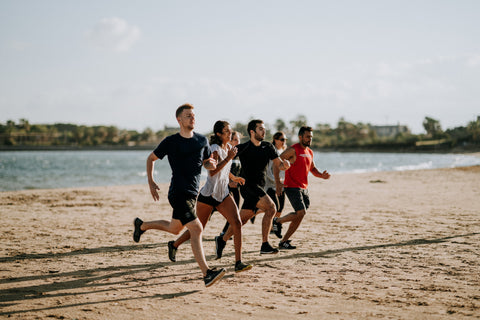Most Effective Vitamins for Restless Legs

Restless Legs Syndrome (RLS) is a condition in the nervous system that affects many people to varying degrees. It frequently affects those who have iron deficiency anemia or end-stage renal disease. It can also have a high prevalence in pregnant women or adolescents with Attention Deficit Hyperactivity Disorder (ADHD). It causes an uncomfortable sensation in the legs that makes you feel an irresistible urge to move them, particularly in the later hours of the day, in the evening or the middle of the night. It can make it very difficult to sleep or even relax, which can be frustrating and even exasperating.
The symptoms represent an unnatural fluctuation of dopamine in your midbrain, which controls the muscles in your body, causing cramps, discomfort, and even pain in your legs. In the long run, it can have adverse effects on your long-term health, so educating yourself about vitamins for restless legs as early as possible is a wise and necessary step towards relief and healing.

Why Are Vitamins Important?
Some people will rush to the doctor at the first sign of a sniffle. While it is important to check with your healthcare professional regularly, it is often a good practice to try some well-researched home remedies first. Then, if the symptoms persist or get worse, you should see a doctor for a professional examination.
Many people are passionate about maintaining a healthy body and mind through natural resources and they have good reasons to do so. The main reasoning behind supplementing your body with vitamins comes from the fact that it is possible to fuel your body with all the vitamins and nutrients it needs from a perfectly balanced and regulated diet.
But if you sit back and take an honest look at your life, it is highly challenging and, for some, impossible to maintain this consistently between careers, families, and everything else that occupies their lives. We all have room for improvement and reaching our goals, but in the meantime, vitamins can work as excellent supplements to fill in your daily health habit gaps.
What Vitamins Help Restless Leg Syndrome?
It can be overwhelming to visit the vitamin shelf and find endless rows of natural cures for every imaginable illness existing. You may be tempted to give up and go home, but you could really miss out on some life-changing benefits. If you need a little help making the decision, here are the top 5 supplements for Restless Legs Syndrome:
1. Iron Supplements
A small dosage of iron supplements is recommended to everyone, even without RLS. Men are recommended to take 8 milligrams per day, women are suggested to take 18 milligrams per day, while pregnant women should be taking 27 milligrams per day. People with iron deficiency anemia should see a doctor for the recommended daily dose, tailored to their particular blood testing. Before highly increasing your daily dosage of iron supplementation, you may want to have your iron levels tested, just to make sure you don’t over-do it. If you take too many iron supplements you could suffer some side effects, which include stomach pain, constipation, or vomiting.
Studies have shown that these supplements help restless legs syndrome. Patients whose serum ferritin was more than 75 Ug/L experienced relief from RLS symptoms after three months. However, taking a dose higher than 85 milligrams per day did not necessarily lead to improved absorption of iron. At some point, your body has had enough and no longer benefits from the high dosage and instead responds with unpleasant side effects.
Your daily iron intake should not be swallowed with any food or milk. It should be taken on an empty stomach, either one hour before eating or two hours after eating. To best improve your health condition, it should be taken together with Vitamin-C.
You may have heard that you must eat red meat to incorporate iron into your food diet, but there are other options as well. Oysters and clams, as well as turkey and chicken, contain iron. For vegetarian options, you can eat vegetables such as pumpkins and squash, or nuts and beans.
2. Vitamin B12
Another vitamin for Restless Leg Syndrome is Vitamin B12. This is water-soluble so it can help to regulate your red blood cells and can prevent neurological disorders. Vitamin B12 also helps with energy production by transforming the food you eat into energy. This is a good vitamin for restless leg syndrome because it prevents your body from turning food into unnecessary fat and storing it. It is called Megaloblastic Anemia. When this happens, it can make your blood flow slower, causing you to feel lethargic and weak and exercise less.
Lack of exercise can be detrimental in any case, but especially if you suffer from RLS. You must keep your legs moving, not just for the sake of your body, but also because of its benefits for your brain. Circulation is essential, and you need that circulation to move at a healthy pace in every limb of your body to keep the symptoms of RLS at a minimum.

3. Potassium
One of the main physical occurrences that make up Restless Leg Syndrome is muscle contraction. Potassium can help loosen your muscles and reduce leg cramps. Oranges and bananas are good sources of potassium, as well as leafy greens and yogurt. But, if the pain is particularly unbearable, you can take Iodine Potassium supplements.
The Iodine Potassium liquid pill helps to pulse your nervous system, which regulates water and can speed up your metabolism by releasing energy and fats that are otherwise stored unnecessarily. Since low potassium levels are often linked with cramps and spasms, the Iodine Potassium can eliminate this feeling of tightness and discomfort that occurs as a symptom of RLS.
4. Folic Acid
Folic acid comes from the water-soluble B-vitamin, folate. Folate is found naturally in foods such as broccoli, cauliflower, and avocado. Folic acid is the synthetic form of folate, and it is added to breakfast cereals, flours, grains, and bread, as required by law in the United States. It is quite common to develop a folate deficiency, since it is difficult for the body to absorb, so many people take folic acid as an additional supplement.
Folic acid is known for being good for the nervous system. This vitamin is not as well-known to help Restless Leg Syndrome but it supports and boosts the nervous system. It also aids in the development of the human body, specifically in the development of DNA. This is why taking a folic acid supplement can relieve the effects of muscle cramps and spasms.
5. Magnesium
Magnesium can be helpful to alleviate symptoms of Restless Leg Syndrome because of its ability to relax the muscles. It has some qualities that block calcium. You may be thinking that calcium is good for you, so why would you want to block it? However, too much calcium can over-activate your nerves, which sometimes triggers muscle cramps.
As with most supplements and vitamins, you should be careful not to overdose. If your body receives too much magnesium, the vitamin will build up rather than cycling through your system. When this happens you can experience some side effects, which include low blood pressure, irregular heartbeat, reduced rate of breathing, and even confusion. So, take a close look at the recommended dosage. Generally, 270-350 milligrams per day is a healthy dose for the average adult - both men and women.
There are some natural forms of magnesium as well. Bananas, nuts, beans, and lentils all contain a small amount. So, next time you are at the grocery store, you may want to stock up on these items.

Causes of RLS
The main contributor for primary RLS is genetics, since most people who claim to have this condition, have also had one or more family members that deal with the same condition. Secondary RLS is a little more complicated since doctors and researchers do not have a black and white answer for what causes RLS, which is one reason why trying supplements for restless legs is a good option.
Some medications also cause or enhance the symptom severity of Restless Leg Syndrome. Antihistamines can block the brain’s dopamine receptors, which slows down your circulation significantly. You may want to lower or even completely cut out your use of medications like Benadryl and consider a low-dose or some less aggressive alternatives. As a replacement, you can eat a spoonful of raw bee pollen every day, which will eventually strengthen your immune system toward the allergy spectrum. You can significantly reduce your allergic reactions like congested sinuses and sneezing, watery eyes and an itchy throat.
Antidepressants or anti-anxiety medications can cause high blood pressure. They often add large doses of serotonin to your body, which inhibits your brain’s receptors and irritate RLS. Both of these cause the symptoms of restless leg syndrome to get worse. If you take antidepressants such as Prozac or Paxil and have recently noticed your RLS symptoms growing, it may be time to speak with your doctor about finding an alternative drug administration that will still have the effects it needs to on your mental health, while still allowing you the ability to relax and get a good night’s sleep. One alternative medication you may want to consider is Norpramin.
Caffeine and alcohol can agitate your Restless Leg Syndrome. They dehydrate your body rapidly, causing swelling of your ankles, wrists, and fingers, which inhibits your bloodstream from circulating properly. Aside from its classic diagnosis as a limb movement disorder, RLS is considered a sleep disorder. If you are having trouble sleeping at night, some of the first things to go are caffeine and alcohol. Most alcohol contains a lot of sugar. Even though you may feel that it slows you down in the evening and helps you go to sleep sooner, you will often find that you wake up just a few hours later. This is because the sugar in the alcohol has reached your bloodstream and has given a jolt to your system, providing you with a false energy kick that wakes you in the middle of the night.
As mentioned before, exercise is important to maintain good circulation, but the time of day can be pivotal when it comes to RLS. If you exercise vigorously before going to bed, you can give your body the false impression that it is time to be productive and to get moving quickly. So, even though your logic tells you it is time to sleep, your body has endorphins pulsing throughout and the leg movements increase instead of slowing down.
Pregnancy can also be a cause of RLS. 20 percent of pregnant women have reported symptoms of restless leg syndrome. The major culprit during pregnancy is an iron deficiency, as it is often quite difficult to maintain a healthy threshold of iron in your body while pregnant. Since you always want to keep the amount of potentially harmful medications at bay when carrying a baby, vitamin supplements are the way to go in this situation.

Other Natural Ways to Treat RLS
Yoga
Since intense physical exercise is not the best option for people who are dealing with Restless Legs Syndrome, yoga can be a very helpful and relieving alternative. Many people believe a misconception that yoga is merely for stretching and flexibility. While that is certainly part of the process, and stretching can also be a means for relaxing the muscles, the real benefits towards treating RLS are in the breathing and the strengthening of your muscles.
When you are practicing yoga, and you're focusing your mind and body on a steady breathing rhythm, almost in a state of meditation, your body follows your mind. By focusing your mind away from the body and away from the cares of the world, your body will begin to lose some of its tension and your muscles will begin to relax.
Eliminate Sugar and Cornstarch
Sugar, especially refined sugars like white sugar, can be very harmful to your body’s systems. Most people are accustomed to eating it in most things they consume because they have started from an early age. These refined sugars are ingredients of all common snacks that can be bought at any grocery store. Yet, even though you may think your body is comfortable with them. You can indeed build up a tolerance, but in the end, you may not realize these processed sugars can bring down your body’s energy levels in a long term way.
If you consume a lot of sugar in a short period, you may have experienced a sugar rush or a sugar high, where you feel a high boost of energy (some call it being ‘hyper’). Unfortunately, quickly after that, you undergo a ‘crash.’ This is because the sugar quickly enters your bloodstream and then leaves it just as rapidly. This kind of inconsistency can affect your muscles and contribute to spasms and cramps.
Warm Salt Water
Soaking your legs in warm salt water provides instant relief to sore or aching muscles, even though it is not known to have long term results or cures to RLS. Soaking in warm water reduces the force of gravity that is pressing down on your muscles, allowing them to loosen up. In a way, they feel lighter. The salt in the water releases magnesium, which soaks through your skin and influences your muscles, allowing them to calm down when they are particularly agitated.
Since the salt in the water absorbs tension, it also absorbs some hydration from the rest of your body as well. It is best to soak in saltwater for just 20 minutes, which is long enough to enjoy its benefits, but not too long to dehydrate you. Don’t forget to drink plenty of water afterward to bring your hydration levels back up to the top.

Decide What Works for You
Each individual has to choose the path of their journey with RLS. Whether you are experiencing primary RLS or secondary RLS, you will have to take into account your own body's strengths and weaknesses in regards to diet and capabilities. You will have to evaluate (with your healthcare professional) any medications you may be taking and consider how to balance them effectively to treat your symptoms of RLS. Exercise properly and at the right time of day. One thing is for sure. Keep your iron supplementation high, and combine it with other valuable supplements for restless legs, like Vitamin B12, potassium, magnesium, and folic acid. If you’re still hesitant, you can take the Tropical Oasis liquid multivitamin to give your body an extra boost to fight SLR. Always make natural remedies a high priority on your list.



